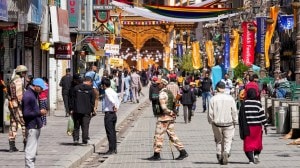Meet to formulate blood donation policy
AUGUST 24: Should a woman donate blood even if her haemoglobin (Hb) count is below the required 12.5? Should a 65-year-old be refused the o...

AUGUST 24: Should a woman donate blood even if her haemoglobin (Hb) count is below the required 12.5? Should a 65-year-old be refused the opportunity to donate blood even if he is healthy? Should every donor be tested for malaria? Should Hepatitis C tests be abandoned because conducting them is not feasible?
These are some of the questions which will be tackled at a national level meet of doctors in charge of blood banks, to be held on August 25 and 26. Presently, blood banks in India operate with independent sets of rules for accepting blood donors. The meet, organised by Tata Memorial Hospital and the Directorate of Health Services, Government of Maharashtra, will formulate a set of regulations for donor-blood screening. This will then be sent to the National AIDS Control Organisation for its approval. The NACO may then standardize these rules for blood banks all over India.
Explaining the present rules for donor screening, Dr Vijayalakshmi Ray, Deputy Director (Q.C.), National Institute of Biologicals, says, “The donor should be between 18-60 years of age with normal blood pressure and no recent history of jaundice, chronic illnesses, serious allergy or indulging in high risk behaviour. The person’s (male or female) haemoglobin count should be 12.5 and above."
However, some blood banks still accept blood from women with Hb 11. There are differing opinions on testing for malaria, correct storage temperature, and testing of collection bags.
The argument for malaria testing is that it is not such a serious disease. If a person gets malaria after being transfused infected blood, he can be treated for the same instead of wasting the discarded blood. But this again will mean taking an undue risk, especially in the case of children or very weak recipients of blood. Dr Ray explains, “The malaria virus cannot be detected in blood unless the person has fever. In most cases, we conduct the test and the virus is not detected. So testing for malaria is not possible.”The central government was to make Hepatitis C tests compulsory from July 1,1997 which would have increased the cost of blood by Rs 150 to 200. But testing has not begun as no provision has been made for such a large number of kits.
Says Dr Sanjaykumar Jadhav, Assistant Director of Health (blood banks), “Blood is already being tested for HIV and Hepatitis B. The more tests you conduct, the more the cost of blood. A number of other tests are conducted on blood donors abroad. But it is neither economically possible nor necessary to apply those standards here. In this meet, we hope to come to a consensus on rules which are plausible, economic and ensure safety.”The participants of this workshop have been asked to fill a questionnaire with over 20 questions on safety in blood collections. For instance: What should be the period upto which a donor should be deferred after a history of jaundice? How should we elicit the history of high risk behavior? Is it necessary to inform donors about any positive tests for infectious disease? The results of this questionnaire and subsequent discussions will lead to the formulation of a policy on blood donation.



- 01
- 02
- 03
- 04
- 05



























